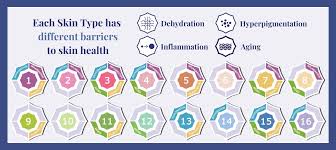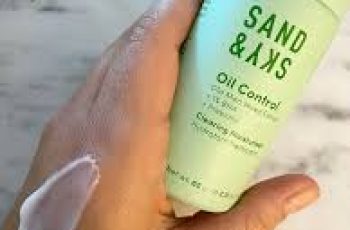
The Best Skin Typing System for Skin Care Routines
Wondering the best way to find out your skin type? You need a proven skin type quiz to diagnose your skin type properly. We use the same skin type diagnostic tool that dermatologists use. I developed and validated it at the University of Miami and now it is in all the major dermatology textbooks and used by doctors. You can find the most recent version of the gold standard skin type quiz used by doctors called the Baumann Skin Type Indicator (BSTI) at the link below.
The 16 skin type system is best for designing personalized skincare routines and sopping for products
The Fitzpatrick Skin Type test is essential for determining appropriate laser and UV treatment settings.
Traditional dry, oily, combination, and sensitive skin type classifications are outdated.
How Do I Find Out What Skin Type I Am?
When trying to figure out your skin type, first ask yourself why you want to know. This helps you find the best skin type quiz to diagnose your skin type according to your needs. For example, if you want to shop for skincare products using your skin type, you need to know your Baumann Skin Type. If you are looking for makeup color recommendations, you need to know your skin tone. If you want to understand your risk of sunburn or if your doctor wants to perform a laser or light treatment and needs to choose the appropriate amount of light to use, the Fitzpatrick Skin Type is best. Each skin typing system is designed for different purposes.
Fitzpatrick Skin Type Test
The Fitzpatrick Skin Type test is not the best way to find out what skin type you are when you are trying to find the best skin care products for your skin type. This is because the Fitzpatrick skin type scale was developed as a way to improve psoriasis therapies. The Fitzpatrick Skin Type corresponds with the skin tanning response to UV and light exposure. It was developed by Dr. Fitzpatrick at Harvard to determine the proper dose of UV light to treat psoriasis.1
The initial version included only lighter skin types and was later updated to include darker skin types. It is now used to choose laser settings.
The current skin color of the patient may not correspond to the Fitzpatrick Skin Type. For example, a Fitzpatrick III Skin Type who avoids the sun and always wears sun-protective clothing and sunscreen may appear to be a Fitzpatrick II.
Using the questionnaire in the Fitzpatrick Skin Typing Questionnaire about how the skin responds to sun exposure is a more effective method of choosing laser settings than looking at the skin color alone.
The Fitzpatrick skin typing system is often incorrectly used to prescribe skin care but it was never intended for this purpose; it only gives information about melanocyte response to light and not about the underlying barriers to skin health such as inflammation and dehydration. The higher the Fitzpatrick skin type number is, the more robust the melanin production response to light is. A higher Fitzpatrick Skin Type suggests an increased risk of post-inflammatory hyperpigmentation and a lower risk of skin cancer due to sun exposure. The Fitzpatrick skin typing questionnaire is more accurate when administered by a dermatologist as compared to self-administered.2 This skin typing system may not be accurate in Asians3 and has been found to be unreliable in Korean skin.4 The Fitzpatrick Skin Type is genetically determined and does not change with time unless the patient is exposed to photosensitizers.
The Fitzpatrick Skin Type:
What is the Fitzpatrick Skin Type Test good for?
The Fitzpatrick Skin Type Test, developed at Harvard Medical School, offers several benefits and serves specific purposes:
Measures Melanin Production: It measures the skin’s ability to produce melanin pigment in response to UV exposure, which is crucial for understanding how your skin reacts to the sun.
Professional Assessment Required: This test must be assessed by a trained medical provider rather than self-administered to ensure accuracy.
Limitations for Some Ethnicities: The test may not be accurate for many Asian ethnicities, highlighting the need for professional evaluation.
Guides UV and Light Treatments: It helps determine the appropriate dose of UV or light to treat skin disorders effectively.
Laser Treatment Settings: The test is useful for selecting the correct laser setting when treating hair or pigmentation issues.
Predicts Pigment Alteration: It helps predict post-inflammatory pigment alteration (PIPA) after lasers, lights, and other cosmetic procedures.
Skin Cancer Risk Prediction: The Fitzpatrick Skin Type Test may help predict your risk of skin cancer based on your skin’s reaction to UV light.
Static Classification: Unlike other skin typing systems, the Fitzpatrick Skin Type does not change over time.
Body-Wide Application: This classification applies to all skin on the body, providing a comprehensive assessment of your skin’s UV response.
The Fitzpatrick Skin Type Test does not correspond to skincare routine or product needs but is essential for medical and cosmetic procedures involving UV and light exposure.
Baumann Skin Type®
The Baumann Skin Type (BST) is used to prescribe facial skin care. The Baumann Skin Type specifies the presence or absence of 4 barriers to skin health: dehydration, inflammation, dyspigmentation, and aging lifestyle factors. These 4 parameters are combined in different combinations into 16 distinct Baumann Skin Types. 6 7
The Baumann Skin Type is identified using a 4 letter designation, and a skin type octagon with a color and a number to help you remember which skin type you are. Your skin type applies to facial skin only.
8 skin types have sensitive skin that exhibits inflammation. These are further divided into 4 sensitive skin subtypes. Sensitive skin types can exhibit more than one sensitive skin subtype. For example, a sensitive skin type can have acne, facial redness (rosacea), and skin stinging.
The Baumann Skin Type reveals the underlying issues that need to be addressed in your skincare routine to improve skin health. By understanding your specific skin type, you can create a highly personalized and effective skincare routine tailored to your unique combination of skin barriers, sensitivities, preferences, and lifestyle habits.
Engaging with fellow skin type enthusiasts by sharing your Baumann Skin Type allows you to compare notes on skincare products, exchange advice, and gain insights from others with the same skin type. This sharing of experiences fosters a deeper understanding of how various products work for different skin types and can help you make more informed decisions about your skincare choices.
Joining a community of like-minded individuals who understand the importance of personalized skincare enhances your skincare journey. By sharing your experiences and learning from others, you can optimize your skincare routine and help others do the same. Take the Baumann Skin Type quiz today to unlock the full potential of your skincare routine and become part of a supportive community of skin type enthusiasts.
The Skin Type Solutions System
When determining your skin type, it’s important to first ask yourself why you want to know. This helps you find the best skin type quiz tailored to your needs. Dermatologists use the Baumann Skin Type quiz to build effective skincare routines rather than relying on the Fitzpatrick Skin Type quiz.
The Skin Type Solutions System (STS) employs advanced software to diagnose your Baumann Skin Type and prescribe a customized skincare routine based on your specific type, preferences, budget, and lifestyle habits. This software uses a validated self-administered questionnaire that has been thoroughly tested across genders (9, 10), multiple ethnicities (11, 12), and various climates (13). Hundreds of dermatologists worldwide utilize this system to diagnose skin types (14, 15), prescribe skincare regimens (16, 17, 18), and conduct research (19, 20).
The STS software works for any brands that meet its stringent criteria. It generates a skincare regimen containing only the ingredients suitable for your skin type while avoiding those that should be excluded. The system also considers multiple factors to layer the products in the proper step-by-step order, enhancing the efficacy of the entire regimen.
Now that you understand the differences between the two most popular skin typing systems, be sure to take our quiz to find your Baumann Skin Type: the most effective and proven skin typing system for finding the right products for your skincare needs.
Your Skin Type Can Change
If you live in an area where the climate changes significantly, your skin type may change. It will also change with:
puberty
pregnancy
menopause
stress
seasonality
diet
habits
increased age
So I recommend that you retake the skin type quiz every year.


